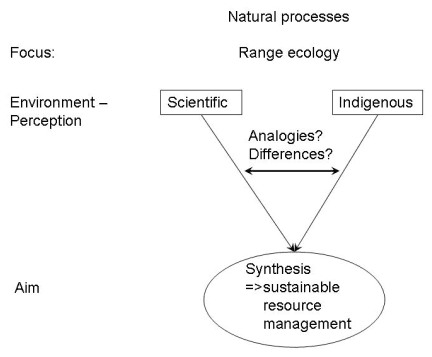
 OBJECTIVES
OBJECTIVES
Indigenous vs. scientific knowledge – going beyond the dichotomy
(Jenny Eisold)
In today´s complex web of social,
economic, political, and environmental challenges western scientific
approaches might in themselves be an insufficient response to human-environment
relationships. (Kaschula et al. 2005)
“Most progress towards sustainable land management will derive from the
synergy of local and scientific knowledge” (Payton et. al., 2003)
Study Aim
The aim of this PhD Thesis is to elaborate the analogies and differences of indigenous and scientific environment perception. This comparison ought to result in a synthesis of the emic (inside) and etic (outside) perception of the natural system to provide suggestions for sustainable resource management strategies.
The focus of this study will be on the perception of natural processes with special emphasis on range ecology and management in savanna ecosystems of southern Africa. Additionally indigenous and scientific landscape classification systems will be analysed to detect the parallels and analogies in further detail.
Questions of interest
-
By which parameters or indicators is landscape classified?
-
Which parameters or indicators influence the decision-making in range management? (Intersection to „New Institutions“)
Fig 1: Flow chart of PhD Thesis concept comparing indigenous and scientific knowledge.
Research Need
According to the UNCCD (2004) “There is a clear lack of connection between traditional knowledge and scientific understanding of the same phenomena.”
A synthesis can
- build partnership for joint problem resolution
Challenge
One challenge when comparing indigenous and scientific knowledge systems is to realize that they cannot be seen as simple equivalents. Examples are shown in table 1 below.
Tab 1: Comparison of indigenous knowledge and scientific knowledge and their differences in use (after Wolfe et. al. 1991)
Methodology
To bring out the different dynamics and concepts of the two knowledge systems a special set of methods is needed. Indigenous knowledge cannot just be adopted/transferred to scientific classification approaches. To objectively recognize the possibly different perceptions of ongoing processes dialogue and participatory methods are needed.
Sampling design
Range management with different background will be analysed
- Pastoralists in Conservcancies
- Himba
- Herero
- Cattle Farms, conventional
Empirical Methods
1. Participatory Rural Appraisal (PRA) (Link)
Possible approaches
a) Mapping (of land units and key-resources) by village or group meeting
b) Individual semi-structured interviews (concerning key-resources or land units)
c) Transect walks
d) Pile sorts and Triads (assigning
e) Seasonal calenders
f) Problem Ranking
g) Future possible (“What is the aim of the community?”)
h) Group interviews/meetings and exhibitions for crosschecking and refining of information
Advantages: Increases participation, supports independence
(Bernard, 1998; Kaschula 2005)2. Vegetation Ecology:
(see also Range ecology methods)along the given Transects
- species list
- beta-diversity
- survey of the disturbance regime
3. Abiotic Parameters
- Macro- and Microrelief (Geomorphology)
- Soil parameters (pH-values, org. Carbon, exchangeable cations, particle size)
- Precipitation Data
- Spatiotemporal availability of water resources (water holes)
The first field period will take place from April to July 2006. The data recorded within this period will be analysed and evaluated with the help of different methods like, for example, multivariate statistics (ANOVA, Clusteranalysis, DCA and PCA) for the vegetation survey.
References
- Bernard, H.R. (1998) Handbook of methods in cultural anthropology. Altamira Press, Walnut Creek
- Kaschula, S.A.; Twine, W.E. and Scholes, M.C. (2005) Coppice harvesting of fuelwood species on a South African Common: Utilizing scientific and indigenous knowledge in Community Based Natural Resource Mangement. Human Ecology, Vol. 33, No. 3, pp. 387-418.
- Wolfe J., Bechard, C., Cizek P. and Cole, D.
(1991) Indigenous and Western Knowledge and Resource Management Systems.
Report based on past continuing research of the faculty and graduate
students of USRPD, Guelph University. Guelph, Ontario. Unpublished.

